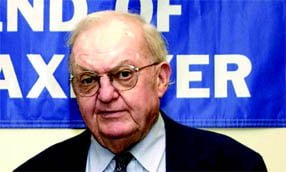Republican Congressman Howard Coble withdrew as a commencement speaker last week after a final push from a fourth of the senior class who protested his February comments supporting internment of Japanese Americans in World War II.
However, the comments were only of secondary concern for several seniors, who also objected to Coble’s steadfast support of the war against Iraq, and for others who disagreed with his overall conservative voting record on topics ranging from the environment to issues of civil rights.
“I had problems with Coble even before he made his infamous interment comments,” said senior Kristina Millhiser, who helped gather signatures for a second round of petitions against Coble’s planned commencement speech.
“I believe his voting record goes against every Quaker tenet you could think of,” Millhiser said.
Senior Caroline Clark spearheaded that petition in response to what she felt was President Kent Chabotar’s lack of serious regard for the first one, signed by 200 students in February.
“I’m more impressed with Coble’s handling of the situation than Kent’s,” Clark said. “Coble stood by what he said about stepping down if one senior protested. Kent did not care what students were saying and didn’t care that we didn’t want him there.”
Chabotar said the weight of the first petition was weakened because the majority of people who signed were not seniors, and because most signed before Coble issued an apologetic statement of regret for any offense his comments may have caused.
Clark’s petition contained signatures from 54 seniors, roughly a fourth of the senior class.
“We knew he had apologized, and that did not effect our not wanting him here,” Clark said.
Coble, who told The Guilfordian in February that he would step down if one senior opposed him, called Chabotar on Wed., April 3 to tell him he had decided not to give the address.
“After our prior conversations on the subject, I expressed my deep regret but did not try to dissuade him again,” Chabotar said in a statement to The Guilfordian.
Chabotar had met with Coble in March for an alumni/prospective student reception at Coble’s office in Washington, DC, and told him that the college would never ask him to withdraw.
“I argued that it was the 50th anniversary of his graduating class and he was a respected member of the Guilford community with a 20-year record of service in the U.S. Congress,” Chabotar said. “Our community needs to hear divergent views on public policy issues on every occasion, including commencement.”
Clark and senior Josh Neas, who was the first person to organize student disgruntlement with his initial petition in February, defended their actions against those who say their protest is intolerant of views not in sync with their own.
“The college never rescinded its offer,” Neas said. “It was always Coble’s decision.
“The point was never to keep Howard off campus, but rather to have him here to facilitate a dialogue about what he said in a way that a commencement speech can’t.”
The second petition, which Clark and others delivered to Coble’s Greensboro office, said “We welcome you to come and speak at Guilford, but we feel that in light of many circumstances . . . your presence as a graduation speaker would be inappropriate.”
Not everyone is happy that Coble won’t be speaking because of the partly politically based protest of some members of the senior class.
“I have heard from alumni and others in the community who are sorry that Mr. Coble will not speak and are again calling the College’s tolerance for different views into question, although I do not think that was the issue here,” Chabotar said.
Neas, who opposes the war in Iraq, said that although anti-war sentiment was not his initial impetus behind his opposition to Coble, it has always been grounds for other people.
Millhiser said her opposition to Coble is colored by her political beliefs, including major disagreement with his environmental views.
“I really do feel there is a Guilford precedent about what represents us and what does not, and a lot of Coble’s positions don’t stand for what the senior class would enjoy having represent them,” Millhiser said.
Neas views it more narrowly, framing it mostly in terms of the internment comments. “This doesn’t have anything to do with him as a Republican coming to a ‘liberal campus,’” Neas said. “His apology did not go far enough in accepting responsibility for his comments enough to make me feel like he represented the interests of the college.”
The non-commencement dialogue which Neas proposed and Chabotar and others facilitated is scheduled for Monday, April 14 in the form of a panel discussion between Coble and others about civil liberties during war.
The panel, to consist of speakers ranging from the American Civil Liberties Union to the U.S. Department of Justice, was assembled before Coble decided to step down as a commencement speaker.
However, Chabotar said in his statement that “The membership on the panel is still not settled and may affect whether the event can be held on April 14th.”
A person involved in the planning of the panel, who spoke under condition of anonymity, said that Coble objected to having John Tateishi, a Japanese American interned during WWII, be a member of the panel.
Tateishi is also executive director of the Japanese American Citizen’s League, which has fiercely criticized Coble ever since his internment comments.
Categories:
Protests Do It; Coble Withdraws
Casey Creel
•
April 10, 2003

()
0
More to Discover
